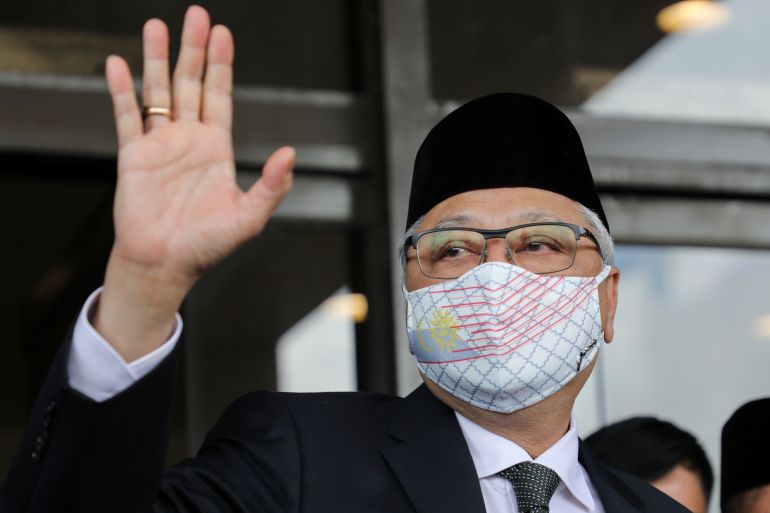Ismail Sabri looks set to become Malaysia’s next prime minister
If confirmed, Sabri’s appointment will mark UMNO’s return to leadership three years after voters rejected it in historic polls.

Former Malaysian Deputy Prime Minister Ismail Sabri Yaakob is moving closer to forming the next government after securing a parliamentary majority from the same coalition that collapsed earlier this week.
If confirmed, Ismail Sabri’s appointment would mark the return of the United Malays National Organisation (UMNO) party to leadership, three years after it lost a general election amid public anger at corruption and the multibillion-dollar scandal at state fund 1MDB.
Keep reading
list of 4 itemsMalaysia’s Muhyiddin resigns after troubled 17 months in power
Malaysia’s political turmoil: Five things to know
Malaysian PM seeks opposition backing in U-turn to stay in power
Caretaker Prime Minister Muhyiddin Yassin, who resigned earlier this week after conceding he had lost majority support, said on Thursday that his coalition unanimously backed his former deputy to ensure continuity of policies on “fighting COVID-19 and the nation’s recovery” until it was suitable to hold elections.
But he added that the support was conditional on Ismail Sabri ensuring that the new cabinet members were free from graft charges, he said in a statement.
Several UMNO politicians were charged with corruption after the 2018 election defeat, the first time UMNO had lost power in Malaysia in 60 years.
UMNO Secretary-General Ahmad Maslan said in a tweet that Ismail Sabri had the support of 114 legislators out of the 222-seat parliament.
A decision on the new government head could be announced as early as Friday when King Al-Sultan Abdullah is due to meet the country’s other senior royals.
The king’s role is largely ceremonial in Malaysia, but he can appoint the person he believes has majority support in Parliament as prime minister. He has already said that the candidate must prove their support in a confidence vote in parliament.
The 2018 election brought the Pakatan Harapan coalition to power under former prime minister Mahathir Mohamad. He resigned in February 2020 after a power grab within the ruling coalition caused its collapse. Rump members of Pakatan then joined forces with Muhyiddin, UMNO and the country’s Islamic party in a fragile coalition of ethnic Malay parties, but UMNO continued to threaten to withdraw its support.
Ei Sun Oh, a senior fellow at the Singapore Institute of International Affairs, said Ismail Sabri’s government might not be stable either.
He added that Malaysians will view Ismail Sabri’s appointment under the same alliance “as nothing more than a game of musical chairs”. He was also the public face of the COVID-19 pandemic response, which has been widely criticised. Malaysia reported a record 22,948 daily cases on Thursday.
“His cabinet appointees are likely to be familiar faces and it is more than likely that similar policies that failed to arrest the pandemic advances or spur economic growth will be continued with minor tweaks.”
The other contender in the race, Anwar Ibrahim, leads a three-party alliance that is the biggest opposition bloc. He is thought to have the backing of about 105 members of parliament compared with 114 for Ismail Sabri. Anwar had been due to succeed then-Prime Minister Mahathir Mohamad before their reformist alliance collapsed.
Whoever becomes prime minister will be taking over at a time when the country’s coronavirus infections and deaths per million rank as the region’s highest.
Public anger has grown in recent months over the administration’s handling of the pandemic with cases spreading at a record pace and hundreds of death each day despite multiple extended lockdowns and a stepped up vaccination programme.
Ismail Sabri studied law and has been in parliament since 2004 holding various portfolios within previous UMNO-led governments, and is one of the party’s three vice presidents. The party president Ahmad Zahid Hamidi is on trial for multiple counts of corruption involving his charitable foundation.